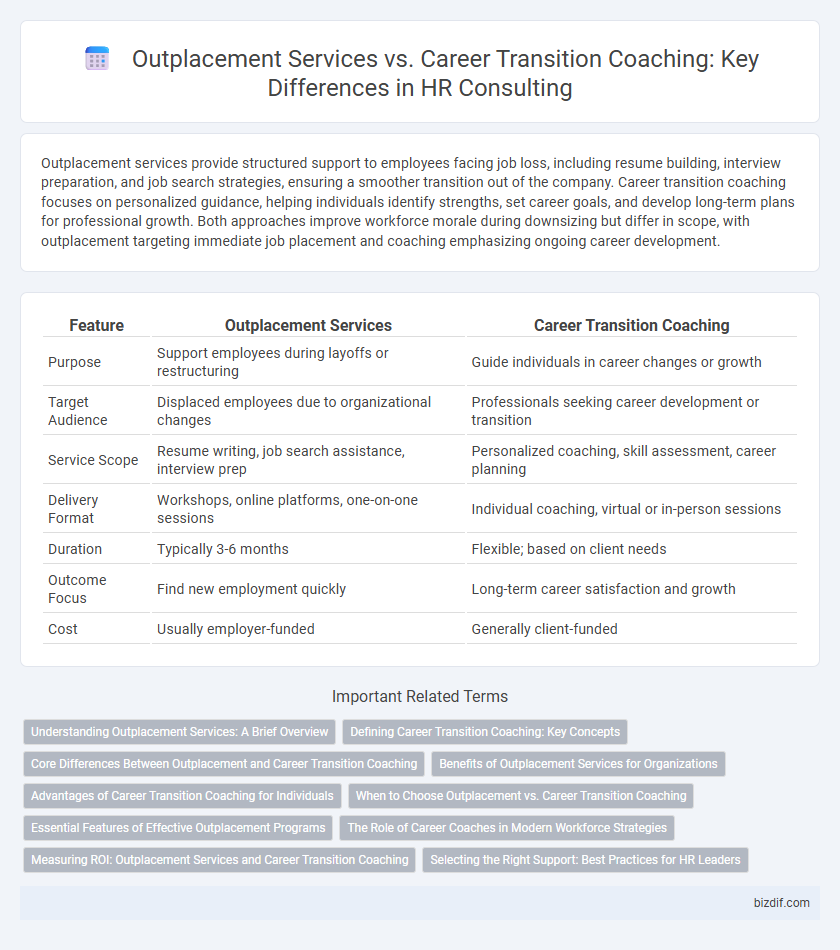Outplacement services provide structured support to employees facing job loss, including resume building, interview preparation, and job search strategies, ensuring a smoother transition out of the company. Career transition coaching focuses on personalized guidance, helping individuals identify strengths, set career goals, and develop long-term plans for professional growth. Both approaches improve workforce morale during downsizing but differ in scope, with outplacement targeting immediate job placement and coaching emphasizing ongoing career development.
Table of Comparison
| Feature | Outplacement Services | Career Transition Coaching |
|---|---|---|
| Purpose | Support employees during layoffs or restructuring | Guide individuals in career changes or growth |
| Target Audience | Displaced employees due to organizational changes | Professionals seeking career development or transition |
| Service Scope | Resume writing, job search assistance, interview prep | Personalized coaching, skill assessment, career planning |
| Delivery Format | Workshops, online platforms, one-on-one sessions | Individual coaching, virtual or in-person sessions |
| Duration | Typically 3-6 months | Flexible; based on client needs |
| Outcome Focus | Find new employment quickly | Long-term career satisfaction and growth |
| Cost | Usually employer-funded | Generally client-funded |
Understanding Outplacement Services: A Brief Overview
Outplacement services provide structured support to employees during job termination, offering resources such as resume building, job search assistance, and interview preparation to ease the transition. These services are typically sponsored by employers to maintain positive employer branding and reduce litigation risks. By delivering tailored guidance and emotional support, outplacement enhances workforce morale and facilitates quicker re-employment outcomes.
Defining Career Transition Coaching: Key Concepts
Career Transition Coaching focuses on personalized guidance to help individuals identify strengths, explore new career paths, and develop actionable job search strategies. This service emphasizes skill assessment, resume optimization, interview preparation, and emotional support during periods of career change. Unlike outplacement services, career transition coaching offers ongoing mentorship tailored to individual goals and industry trends.
Core Differences Between Outplacement and Career Transition Coaching
Outplacement services primarily support employees through structured programs during layoffs, offering resources like resume writing, job search assistance, and interview preparation to facilitate reemployment. Career transition coaching focuses on personalized guidance to help individuals clarify career goals, develop strategies, and build skills for long-term career development beyond immediate job loss scenarios. The core difference lies in outplacement's emphasis on job placement assistance during organizational downsizing versus coaching's broader approach to career growth and professional development.
Benefits of Outplacement Services for Organizations
Outplacement services provide organizations with structured support to ensure smooth employee departures while preserving employer branding and boosting morale among remaining staff. These services reduce litigation risks and associated costs by facilitating transparent communication and providing professional job-search assistance to outgoing employees. Investing in outplacement enhances workforce stability, supports talent retention, and fosters a positive corporate reputation crucial for attracting future talent.
Advantages of Career Transition Coaching for Individuals
Career transition coaching offers personalized support, helping individuals identify strengths, set realistic career goals, and develop tailored job search strategies. This approach enhances self-confidence and adaptability, empowering clients to navigate the evolving job market effectively. Unlike generic outplacement services, career transition coaching provides ongoing mentorship and skill development, resulting in higher success rates for long-term career advancement.
When to Choose Outplacement vs. Career Transition Coaching
Outplacement services are ideal for organizations managing workforce reductions and seeking structured support for displaced employees, offering resources like resume writing, interview preparation, and job search assistance. Career transition coaching suits individuals aiming for personalized guidance to explore new career paths, develop tailored strategies, and improve professional skills during job changes. Choosing outplacement focuses on organizational responsibility and employee reassurance, while career transition coaching emphasizes customized career development and long-term growth.
Essential Features of Effective Outplacement Programs
Effective outplacement programs provide personalized career transition support, including resume development, interview preparation, and job search strategies tailored to individual needs. They integrate emotional support and skill-building workshops to enhance employability and confidence during workforce displacement. Emphasis on one-on-one coaching and access to industry-specific job networks significantly improves reemployment outcomes.
The Role of Career Coaches in Modern Workforce Strategies
Career coaches play a pivotal role in modern workforce strategies by offering tailored guidance that enhances employee adaptability and long-term success. Outplacement services focus on supporting displaced employees through job search assistance and emotional support, while career transition coaching provides comprehensive skill development and strategic career planning for active workforce members. Integrating career coaching into organizational initiatives drives retention, engagement, and agile talent management.
Measuring ROI: Outplacement Services and Career Transition Coaching
Measuring ROI in outplacement services involves tracking metrics such as time-to-reemployment, employee satisfaction scores, and reduction in legal risks, which offer quantifiable outcomes for organizations. Career transition coaching's ROI is often assessed by client progress indicators like goal achievement rates, skill development milestones, and long-term career success, reflecting personalized value. Combining data-driven insights from both approaches enables HR professionals to optimize talent management strategies while minimizing costs related to turnover and disengagement.
Selecting the Right Support: Best Practices for HR Leaders
HR leaders should evaluate organizational goals and employee needs when selecting between outplacement services and career transition coaching, ensuring alignment with desired outcomes such as employee retention, brand reputation, and workforce agility. Outplacement services provide structured support for departing employees through resume building, interview preparation, and job search strategies, while career transition coaching offers personalized guidance to enhance skills, clarify career goals, and navigate professional changes. Leveraging data-driven assessments and employee feedback helps HR professionals tailor support programs that maximize engagement, improve transition success rates, and reinforce the organization's commitment to employee well-being.
Outplacement Services vs Career Transition Coaching Infographic

 bizdif.com
bizdif.com